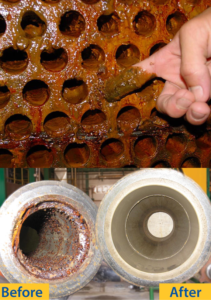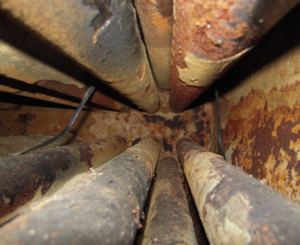Why your boiler is not clean?
The presence of hardness salts in boiler water leads to formation of deposits, technically known as ‘scale’, which has a very low thermal conductivity and impacts the evaporation rates. Scale deposits and corrosion are the two most important adverse effects of feed water impurities which influence the energy consumption
Boiler Scale Deposit: The most important salts contained in water, which influence the formation of deposits in the boilers, are the salts of calcium and magnesium, which are known as hardness salts. Calcium and magnesium bicarbonate dissolve in water to form an alkaline solution and these salts are known as ‘alkaline’ hardness. They decompose upon heating, releasing carbon dioxide and forming a soft sludge, which settles out. See the picture below on scale deposit.

Boiler Corrosion: Makeup water also contains considerable amounts of dissolved oxygen, which is a prime cause of corrosion. The high heat intensity of the evaporation accelerates the oxidation, scaling and corrosion process. The pitting corrosion leads to boiler tube failures and might damage the downstream equipment. Generally, the higher the makeup water, the higher will be the impurities and the dissolved oxygen loading. See the picture below on boiler corrosion.

What is the effect of unclean boiler on fuel cost?
Decreases Thermal Conductivity: Scale causes fuel wastage typically up to 2% for water-tube boilers and up to 5% in fire tube boilers. As a rule of thumb, one millimetre of scale build-up can increase fuel consumption by 2%. The figures below bring out the importance of the scales and its influence on energy consumption.
Increases Boiler Blow down: When water is converted to steam, the dissolved solids do not travel with the steam, but are left behind in the boiler water. Fresh makeup water enters the boiler to replace the amount lost through steam evaporation. When this new water is converted to steam, more solids are left behind. As steam is continually produced, evaporated, and replaced with new water, the amount of solids in the boiler continues to increase indefinitely until the water is unable to dissolve its own impurities or hold them in solution. These will inevitably collect in the bottom of the boiler in the form of sludge, and are removed by a process known as bottom blow down.
This brings out the importance of the good quality water and its influence on energy conservation in a boiler.
Now, assume you have a 5000 kg/hr. or say 320 BHP steam boiler of 80% efficiency and operating at 10.54 bar pressure on imported coal having an NCV of 5700 Kcal/Kg.
Then the approximate fuel consumption per hour will be 600 Kg.
If you are operating the boiler for say, 24 hours in a day, 30 days in a month and your fuel coat per Kg is 5 pesos. Then your total fuel cost per year will be
Annual Fuel cost + 600 X 24 x 30 X 12 = 5,184,000 pesos
From the table above 1/32” thickness of scale will correspond to 2% of fuel loss.
Hence Annual money lost due to boiler scaling = 103,680 Pesos
Now let’s calculate the money lost due to Excess Blow down
F = E / (1- B), Where:
F = Feed water requirements, kg/day
E = Steam generated, kg/day
B = Blow down, percent (expressed as decimal)
At 10 percent blow down,
F = (5000*24)/ (1- 0.10) = 133,333 kg/day
At 5 percent blow down,
F = (5000*24)/ (1-0.05) = 126,315 kg/day
The daily reduction resulting from the 5 % blow down decline is 7017 Kg, which is applied to determine fuel savings. (Heat content values are obtained from saturated steam tables).
S = R x H x C / (V x E), Where
S = Fuel savings, dollars/day
R = Blow down reduction, Kg/day
H = Blow down heat content, Kcal/Kg
C = Fuel cost, Peso per unit
V = Fuel heating value, Kcal/Kg
E = Boiler efficiency, % expressed as decimal
S = 7017 x 171 x 5 / (5700 x 0.80)
S = 1315 peso /day
Hence Annual money lost due to Blow down = 1315*365= 479,975 Pesos
Total Money lost due to usage of bad quality feed water
= 103,680 +479,975 = 583,655 Pesos
How to prevent this Money loss?
Three methods to keep your boiler clean:
- Pre-treatment of boiler make-up water (using water softeners, demineralizers, and reverse osmosis) to remove the scale forming minerals before they enter the system.
- Chemical injection into the boiler feed water for instance acid or phosphates to keep the common scale forming materials in dissolved form.
- Adopting proper boiler blow down practices: Limit the concentration of scale forming materials by controlling cycles of concentration. Some water is purposely drained off (blow down) to prevent minerals built up.






